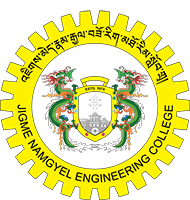Department and Programme Overview
Jigme Namgyel Engineering College (JNEC), established in 1974, is one of the oldest engineering colleges in the country. Bachelor of Engineering in Power Engineering was started in Jigme Namgyel Engineering College in the year 2015. The college had the privilege to receive the honorable Prime Minister, Lyonchhen Tshering Tobgay, to preside over the inaugural ceremony and to inaugurate the programme on 27th October 2015. The program was developed and initiated with the vision of the Golden Throne to provide competent engineers with expertise in planning, operation, maintenance and sustainability of hydro power plants of any magnitude. The focus of the programme is mainly in Power System and Renewable Energy. Department of Electrical Engineering at JNEC is the only college in the country to offer Bachelor of Engineering in Power Engineering programme.
The program is a promising platform for development of technical expertise in Hydro Power Technologies. The four years program is a mould for shaping enthusiastic individuals in theoretical, practical and design aspects of establishing and estimating, commissioning and operating, troubleshooting and enhancing the outcomes of a hydropower stations and explore other renewable opportunities in the country. The broad intention for initiating a B.E. in Power Engineering is to create knowledgeable and skilled work force who can implement and carryout operation and maintenance aspects of power plants, power corporations and industries and address the need for power engineers to contribute to the socio-economic development of the country.
Curriculum Highlights
In addition to core engineering studies, the program includes a good mix of other studies such as Academic skills, Dzongkha, Engineering Economics and management and Environmental Science to provide an all-round capacity in research, debate and management skills. The curriculum highlights are provided as:
| Analog and digital electronics | Electrical Power Transmission and Distribution |
| DC and AC machines and Transformers | Power system operation and control |
| Electrical Power generation | Microcontroller and embedded system |
| Hydropower engineering | High voltage engineering and insulation coordination |
| Energy management and auditing | Power electronic application |
| Automatic control systems | Renewable energy resource |
| Power system protection and switch gear | Power system analysis and stability |
| Utilization of Electrical Energy | Power system optimization. |
| Illumination Engineering (Basic & Advance) |
Module Matrix
Practical & Field based Curriculum
The program also provides 6 weeks on the job training in relevant organizations. The training aims to provide a bridge between theoretical and practical aspects of Engineering. The students have the opportunity of field trips and industrial tours to familiarize themselves with the actual working platform. The students are required prepare and present a technical seminar in the area of individual interest as a credited module as part of on-the-job training. An intensive project work is included in the final year curriculum which will enable students to assimilate, incorporate and apply the learning in the college in a realistic application oriented work. This will also enable students to prepare project reports, seminar reports and write conference papers. Their research capability will be enhanced. Through the project work, student also strengthens their skills of exploration, teamwork and problem solving skills.
Learning Outcomes:
The graduates of B.E. in Power Engineering will be able to:
- Plan, design and prepare layout plans for cost effective power electronics and electrification works.
- Implement software tools such as ETAP, PSCAD, SCADA, MiPower etc. in the power system design, operation and maintenance works.
- Carry out reconnaissance, feasibility study of hydropower plant and prepare detailed project report of hydro power plant.
- Carry out distribution planning, load forecasting and illumination level design for domestic, commercial and industrial consumers.
- Design hardware interfacing circuits comprising PIC microcontrollers programming and construct a useful embedded system.
- Develop an algorithm for optimal power flow, develop integration of PV cells to the main systems and conducting energy auditing.
- Analyze and troubleshoot fault that may be encountered in power system networks and industrial electrical system.
- Demonstrate analytical skills, logical thinking, and communication skills that are necessary for a professional engineer or an entrepreneur.
- Explore the necessities of water resources and mechanical engineering related to hydropower and alternative energy.
- Implement safety measure, team dynamism and professional ethics which are the expected aspects of a professional engineer.
Career Prospectus
The Programme provides opportunities to students wishing to undertake professional undergraduate programme in Power Engineering within the country and become power engineers and industry leaders. The programme aims to produce engineers with ability to assist in leading complex multidisciplinary projects and also apply related software and IT tools in the field of Power Engineering and alternative energy. The program is paramount and the only Engineering programme, dedicated to Power Engineering in the country. With the reputation of Hydro Power sectors in the country and rapidly growing industrial sectors, the course will be a pathway to shape individuals for national and international markets with promising career and future. It is expected that the power plants, power corporations and medium and large scale industries will find the graduates most suited for their requirement.
For further information about the programme
Dean, Research and Industrial Linkages
Contact number: +975 7 260202 (O)
Jigme Namgyel Engineering College
Dewathang: Samdrup Jongkhar
Email:hemlalbhattarai@jnec.edu.bt
